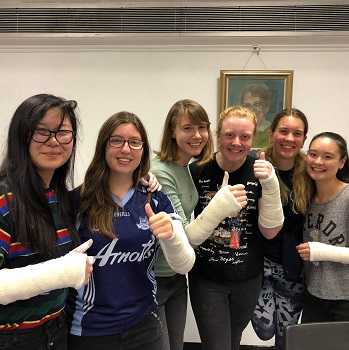
Hi, I’m Alexandra. My route into medical school was slightly less conventional – I only started to consider medicine as a potential career path after a period of illness when I was at university studying Chinese.
I started working as an Occupational Therapy Assistant in a brain injuries unit and after getting over my doubts about whether re-applying for a medical degree was viable, I ended up getting into Edinburgh through undertaking an access to medicine course.
You will find your people
There was a real mix of individuals on the course – a history graduate, professional dancer, mental health nurse, journalist, electrician…! This just goes to show that a medical degree is not solely for school students or Biomedical Science graduates.
As well as being really excited about starting university, I was apprehensive about the age difference between me and the other first years. A discussion in the group chat leading up to Welcome Week about being 17 and how to get into club nights made me feel really old!
Although the mature students are few and far between in my year, I haven’t ever felt this has impacted my university experience. In a year of over 200 students, you WILL find your people and make close friends.

Get involved
My advice would be to say ‘yes’ to opportunities.There is so much happening, not just within the medical school, but throughout the whole university, and by attending events you will meet people of all ages and backgrounds.
I have an extended academic family – second year students who have given myself and my first year siblings so much invaluable advice and a lot of fun times. I’m several years older than my ‘parents’ but it just doesn’t matter at all!
Have confidence in your abilities
I was also worried prior to starting medical school that I would somehow be at a disadvantage having not come straight from school, and having taken a significant period of time out of education before starting my year-long access course. In fact, the course is designed so that the basics are recapped at the start of each topic.
I remember in one of our first ‘acute medical situations’ lectures, the lecturer, an A&E consultant, shared his own experience of feeling inadequate compared to his peers when he started university, and reminded us that we all deserved to be sitting in that lecture theatre and we are all capable of succeeding. This stuck with me as I definitely had imposter syndrome, and I soon realised that lots of people were feeling the same way. Have confidence in your abilities. Remember, there is always plenty of support available if you need it, so don’t be afraid to ask for help.

Draw on skills you already have
You will find that the life experience gained doing whatever you’ve been doing since leaving school will be a great asset. Aside from the more obvious things like not having to adjust to living away from home and cooking your own meals for the first time, you’ll be ahead when it comes to time management, coping with stress, maintaining a work-life balance, and so on.
Right from the outset, the pace of medical school is fast. I think that had I come straight from school, I would have been totally overwhelmed at the vast amount of information thrown at us in lectures, but now I can stay level-headed. If you’ve studied at university level before, you’ll know how to prioritise and what learning style works best for you. Through employment you’ll have organisational skills, self-discipline and you’ll be well ahead when it comes to interview technique.
Honestly, this year has been incredible and I can’t wait to see what the next five have in store. If you’re a mature student thinking about applying for medicine here in Edinburgh, I would say go for it! The application process is daunting but be proactive, do your research and take it step by step.


